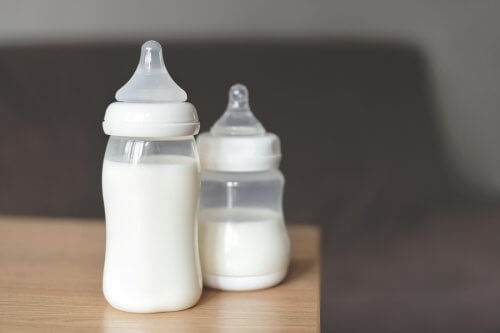Learn All About Infant Formulas
There’s a great variety of infant formulas to choose from. Discover all about the different types that exist in this very interesting article!

Breastfeeding is the optimal form of newborn feeding. But when mothers don’t or can’t breastfeed, they usually opt for infant formulas. In this article, we’ll explain the different types of infant formulas that exist. You should choose one depending on the needs of your baby.
The different types of infant formulas that exist
Infant formulas are suitable foods for infants to replace all or part of human milk, satisfying the infant’s normal nutritional needs.
All of them usually come in powder form to dissolve in water (usually 13%, and it’s advisable for it to be previously boiled) or already prepared for direct use in liquid form.
Therefore, it’s important to choose the right product for your baby, both to meet their needs, not overfeed them, and allow them to achieve optimal growth and development.
The Committee on Nutrition of the AAP (American Academy of Pediatrics), ESPGHAN (The European Society for Pediatric Gastroenterology Hepatology and Nutrition), and the Scientific Committee on Food (SCF) of the European Commission established recommendations on the qualitative and quantitative characteristics that infant formulas should possess.

There are several types of formulas, such as cow’s milk formula, soy protein based formulas, protein hydrolysate formulas, and specialized formulas.
Starter formulas
They completely meet the infant’s needs. They’re used from birth up to four to six months of age. Although they come from cow’s milk, they imitate the composition of breast milk.
Follow-on formulas
These are designed for use from four to six months of age, and always as part of complementary feeding. Parents can feed them to their children under three years old. As for their composition, there are no strict limits on their energy content, as the child also consumes other foods.
Specialized infant formulas
These special formulas are for infants and young children who have problems or limitations in their absorption or digestion processes or can’t metabolize certain substances. For their elaboration, manufacturers simply make modifications to normal formulas.
Lactose-free formula
In these infant formulas, lactose has been totally or partially replaced by dextrinomaltose or glucose polymers. It’s for infants with congenital or acquired lactase deficiencies. In addition, it’s also for those who suffer from galactosemia (a monogenic disorder of carbohydrate metabolism).
Due to the beneficial effect of lactose on calcium and magnesium absorption, it’s good to continue feeding it to the infant temporarily until they recover their enzymatic activity.
Soy infant formulas
These formulas use purified soy as a protein source. In this sense, this soy is treated to reduce the activity of trypsin and hemagglutinin inhibitors. The following infants consume it:
- Infants who follow a lactose or galactose free diet.
- Those of vegan parents.
- Those who are allergic to the proteins in cow’s milk.
- Those who suffer from diarrhea.
- Those who suffer from eczema.
Formula for premature babies (preemie formula)
If your baby is born premature, they may need to drink a special formula called preemie formula, since it contains more proteins, carbohydrates, and lipids. Therefore, it contains more calories in fewer volumes than standard formulas.

Protein hydrolysate formulas
Another type of infant formula is protein hydrolysate formulas. In these preparations, the proteins are predigested by thermal and enzymatic hydrolysis. Depending on the degree of hydrolysis, they’re divided into two groups: hypoallergenic and hypoantigenic formulas. Medical professionals indicate them for babies who suffer from:
- Fat malabsorption.
- Cow’s milk protein allergy (CMPA).
- Prolonged diarrhea.
- Vomiting.
- Colic.
Amino acid-based formula or elemental formula
Amino acid-based formula, also known as elemental formula, exists as well. In these preparations, the proteins are provided in the form of synthetic amino acids, which determine their high osmolarity, their high renal solute load, and their bad taste. However, their antigenic potential is null. The indications of this type of formula are very restrictive:
- Serious allergy to cow’s milk protein.
- Failure in the treatment of hydrolyzed formulas.
- Severe malnutrition.
- After prolonged parenteral nutrition.
Infant formulas for minor problems
Anti-regurgitation formulas
The ingredients these formulas contain are intended to treat infants with regurgitation. For this purpose, the manufacturers add a thickener, which can be carob seed flour or corn or rice starch, to them.
Anti-constipation or anti-colic formulas
The manufacturers modify their triglycerides to obtain palmitic acid in β-position, a composition similar to that of breast milk. In addition, some of them contain more magnesium with a laxative effect.
